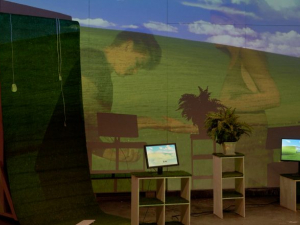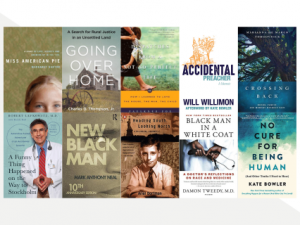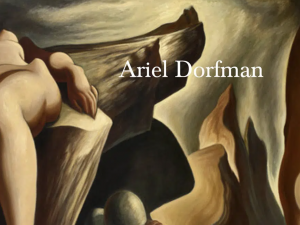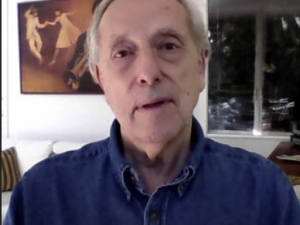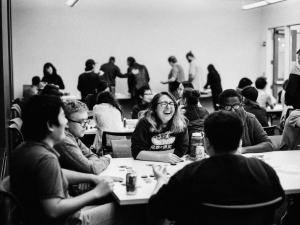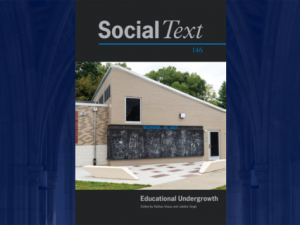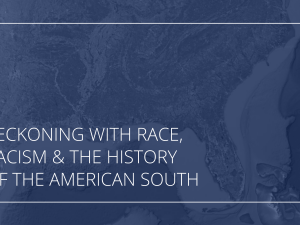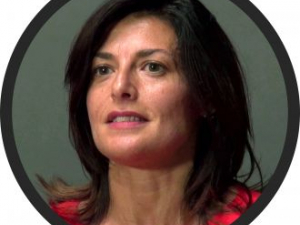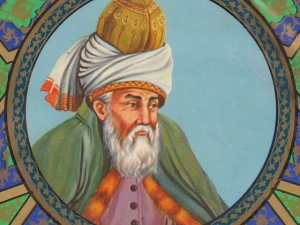There are times when a Duke author has knowledge to share but it just won't work as a scholarly publication. The books below all address large issues, from fighting tyranny to facing death, but they come through the personal stories of the authors. These books, along with many others, are available at Duke University Libraries, the Gothic Bookshop or the Regulator Bookshop. No Cure for Being Human (and other truths I need to hear), by Kate… read more about 10 Duke-Authored Memoirs Have Stories to Tell »
If you don’t think a laboratory is the ideal place to explore complex themes and methodologies like valuing care, ethnography, urbanism or games and culture, you may need to expand your definition beyond beakers and microscopes. Labs are hives of communication, cooperation and active collaboration. They are driven by a commitment to curiosity and exploration that often produces unanticipated paths and solutions. And utilizing those features for research in the humanities – a scholarly area that has traditionally focused on… read more about Innovative, Interdisciplinary Labs Reshape Humanities Research and Teaching »
Four visiting humanities scholars from historically Black colleges and universities and liberal-arts institutions arrived at Duke this August to collaborate with Duke students, faculty and staff. Their projects will cover commemoration practices, early Christian manuscripts, a 17th century Mexican philosopher and the ephemeral nature of digital projects. The fellows are part of Humanities Unbounded, an Andrew W. Mellon Foundation-funded initiative designed to nurture collaboration and inventive expressions of the… read more about Duke Welcomes New Cohort of Visiting Humanities Scholars from HBCUs and Liberal-Arts Schools »
When he was an undergraduate political science student, Kerry Haynie was never taught about the 1921 Tulsa massacre. Nor was there much discussion about the role of race in the founding political documents of this country or much examination of how race influenced public services such as sewer lines and zoning. In one sense, a lot has changed. In 2021, Duke’s faculty includes a strong lineup of leading scholars who examine how race is embedded in issues that cross all the schools of the university. This fall, many of… read more about University Course Raises Race as a Central Element of Undergraduate Education »
When Egyptian writer Nawal el-Saadawi arrived at Duke University in January 1993, it was supposed to be a short-term residency. It ended up as a four-year visit that made for a series of memorable classes and lectures and lasting relationships between Saadawi and several Duke faculty and students. Her time at Duke may also have saved her life. Saadawi, who died March 21 and was praised in obituaries in the New York Times and elsewhere as one of the leading feminist voices in the Arab world in more than 50 books of fiction… read more about When Duke Gave Shelter to An Egyptian Intellectual »
Once coronavirus lockdown orders and social distancing rules went into effect, people began to consume more visual media than ever before. Streaming platforms saw their numbers surge as subscribers binged new shows and watched movies into the wee hours of dawn. Behind the scenes, however, million-dollar film and television productions were forced to come to a halt. In the interval, many independent filmmakers began to rise and release fresh media. Working with the resources and knowledge they had, new filmmakers seized the… read more about Student Filmmakers Seize the Moment as Industry Adapts »
As part of its event series tgiFHI, the Franklin Humanities Institute is conducting interviews with its faculty speakers in order to familiarize broader audiences with the diversity of research approaches in the humanities, arts, and interpretive social sciences at Duke University. Roberto Dainotto is Professor of Literature, Italian, and International Comparative Studies. In this edited and condensed interview, he describes how the popularization of the novel occurred at the same moment as the politicization of the… read more about Meet Your Humanities Faculty: Roberto Dainotto »
This month, we present a collection of 12 Duke-authored books documenting women's contributions to history, culture and society. These books, along with many others, are available at Duke University Libraries, the Gothic Bookshop or the Regulator Bookshop. Women and the War Story by Miriam Cooke In “Women and the War Story,” Professor Emerita miriam cooke charts the emerging tradition of women’s contributions to what she calls the “War Story,” a genre formerly… read more about 12 Duke-Authored Books on Women's History »
This month we offer a collection of Duke-authored works that reflect human experiences through fiction. These books along with many others are available at the Duke University Libraries, the Gothic Bookshop or the Regulator Bookshop. A Life of Adventure and Delight by Akhil Sharma WHAT IT'S ABOUT: In "A Life of Adventure and Delight," Professor Akhil Sharma delivers eight stories that focus on Indian protagonists at home and abroad. A… read more about 10 Works of Fiction from Duke Authors »
Ariel Dorfman, the Walter Hines Page Distinguished Research Professor Emeritus of Literature, wrote an op-ed for CNN arguing that "Americans, awakened by the traumatic Trump experience to the more permanent frailties and limitations of their governing system, should not waste this unique opportunity to simultaneously tackle a festering crisis of democracy itself, which, if left unaddressed, will continue to endanger the republic." read more about What Trump Has Made Blindingly Clear to America »
When COVID hit last spring, many graduate students had to give up their summer plans for teaching, field research and internships. The Provost’s Office quickly pledged support, and Vice Provost Ed Balleisen spearheaded the effort to identify virtual opportunities. Experiential fellowships with eight host organizations and research assistantships with more than 20 Duke units provided summer funding and career development for all 59 Ph.D. students in need. Every student who responded to Duke’s end-of-summer evaluation would… read more about Duke Ph.D. Students Find Unexpected Benefits in an Unusual Summer »
As part of its event series tgiFHI, the Franklin Humanities Institute is conducting interviews with its faculty speakers in order to familiarize broader audiences with the diversity of research approaches in the humanities, arts, and interpretive social sciences at Duke University. In this edited and condensed interview with Dr. Luciana Parisi, Professor of Literature, she describes how she become interested in cyberpunk, the role of bacteria in human evolution, and whether technology is good, bad - or both. Dr. Parisi will… read more about Meet Your Humanities Faculty: Luciana Parisi »
A Message from the Program Officers Dear graduates of the Global Cultural Studies Major and the Program in Literature: Our heartiest congratulations on the successful completion of your studies during the COVID-19 global crisis. Watching each of you grow in intellect, imagination, and critical sophistication has been our absolute pride and joy, and we are confident that what you have achieved here is only the beginning of a lifelong process of learning, one that will take you… read more about Literature Congratulates the Class of 2020! »
April is National Poetry Month. As the coronavirus pandemic continues, we wondered if Duke’s writers and literature scholars are turning to particular poems right now, perhaps for their beauty, wisdom, or potential to inspire, or as a mirror for this moment. Duke Today reached out to three professors in Duke’s English department and literature program with the question, “What poem are you reading now?” Faulkner Fox, a writer and lecturing fellow in the English department, is the guiding force behind the “… read more about Poems for this moment »
The exploration the public lives of the “first ladies” of America’s Christian evangelical megachurches and an intimate portrait of the joys and hardships of rural life in Appalachia are among the new noteworthy books by Duke authors this fall. Many of the books, including new editions of previous titles, can be found on the "Duke Authors" display shelves near the circulation desk in Perkins Library. Some are available as e-books for quick download. Most can also be purchased through the Gothic Bookshop. [Duke Today will… read more about Fall Books: Clean Hands, Aging Brains, Evangelical Women and Other Great Reads »
Michael Hardt, professor of literature and a pre-eminent Marxist scholar, has directed the Marxism and Society certificate program at Duke for several years. At the same time, his career has generated controversy from some who consider him a radical academic—he was named on a recent Professor Watchlist, which seeks to document college professors who "promote leftist propaganda" and is produced by the conservative nonprofit organization Turning Point USA. The Chronicle spoke with Hardt about his… read more about 'A center of Marxist thought': Head of Marxism certificate explains program's role at Duke »
Durham, NC - Duke University faculty members Jack Knight and Rey Chow have been elected members of the prestigious American Academy of Arts and Sciences. Knight is the Frederic Cleaveland Professor of Law and Political Science and chair of the political science department, and Chow is the Anne Firor Scott Professor and director of the Program in Literature. They join 213 new members, including scholars, scientists, writers, artists and civic, business and philanthropic leaders. The new class will be inducted… read more about Rey Chow Elected to American Academy of Arts and Sciences »
Durham, NC - Srinivas Aravamudan, professor of English and former dean of the humanities at Duke, died on Wednesday. He was 54. Aravamudan, a scholar of 18th-century British and French literature and postcolonial literature, was also a champion of the humanities, committed to nurturing and promoting their role in contemporary society. At Duke, his leadership included serving as director of the John Hope Franklin Humanities Institute, as dean of the humanities and as director of the Humanities Writ Large initiative.… read more about Duke Flags Lowered: Humanities Advocate Srinivas Aravamudan Dies »
Now that recent Senate votes have guaranteed that the agreement to curb Iran’s nuclear program will go into effect, what more can America do, beyond the strictest vigilance, to build on this historic breakthrough for peace? Perhaps it is time for the citizens of the United States to experience a breakthrough of their own, to go beyond past prejudices against their enemy and use the occasion to gently plunge into the deepest wells of Persian identity that originate in a civilization preceding ours by many centuries. We can… read more about A Time for Literary Diplomacy »
It is probably not immediately obvious what interest a new theoretical study of science fiction holds for the mainstream adepts of literary theory; and no doubt it is just as perplexing to SF scholars, for whom this particular subgenre of the subgenre, the time-travel narrative, is as exceptional among and uncharacteristic of their major texts as SF itself is with regard to official Literature. To be sure, so-called alternative or counterfactual histories have gained popularity and a certain respectability; my personal… read more about Book Review: Time Travel - The Popular Philosophy of Narrative »

